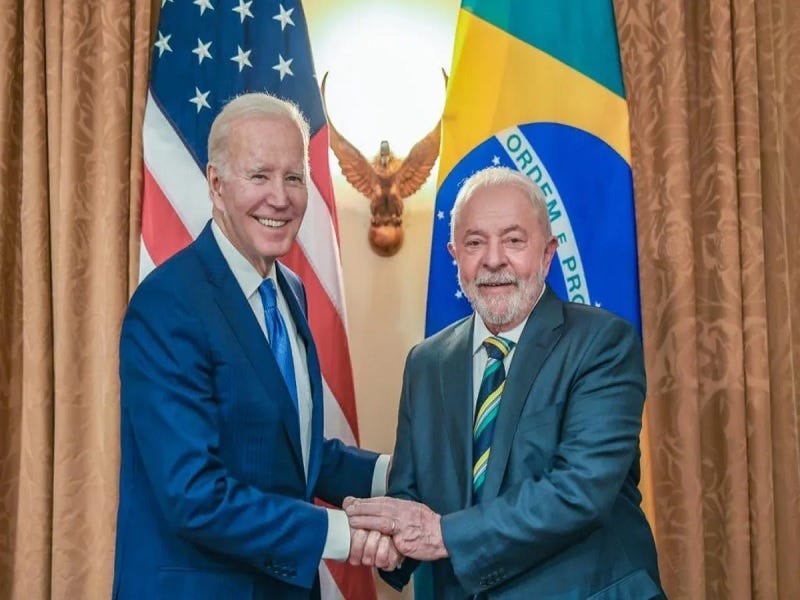US Fears Brazil Will Threaten Its Power in UN Security Council

Washington does not support Brazil’s entry into the United Nations Security Council (UNSC) for fear that the country will adopt divergent positions in votes on issues critical to the United States and that it will be another BRICS member in the body.
Brazil’s demand for a seat in the UNSC is long-standing, but the US has resisted accepting expansion. The US ambassador to the UN, Linda Thomas-Greenfield, recently stated that Washington does not guarantee its support for Brazil in an eventual expansion. She stressed that the US would only endorse the candidacies of India, Germany and Japan, which, together with Brazil, form the G4 — a group that advocates the expansion of the organization.
“We have expressed our support for Japan and, Germany and India. We have not explicitly expressed support for Brazil,” she said on September 12 at a Moderated Conversation on the Future of Multilateralism and UN Reform at the Council on Foreign Relations.
 The South American country has adopted diplomacy characterized by independence, often misaligned with Washington’s interests. This explains the support for strategic allies with whom Washington has more stable and predictable relations. Supporting Brazil’s inclusion could create an undesirable precedent, encouraging demands from other countries and leading to an expansion of the council that would exceed Washington’s desired limits. The US seeks to maintain its privileged position by resisting changes that could compromise the effectiveness of the veto power.
The South American country has adopted diplomacy characterized by independence, often misaligned with Washington’s interests. This explains the support for strategic allies with whom Washington has more stable and predictable relations. Supporting Brazil’s inclusion could create an undesirable precedent, encouraging demands from other countries and leading to an expansion of the council that would exceed Washington’s desired limits. The US seeks to maintain its privileged position by resisting changes that could compromise the effectiveness of the veto power.
However, Brazil’s entry into the UNSC would add a Latin American perspective, a notoriously underrepresented region. As a leading emerging economy, Brazil would have the capacity to amplify the voices and demands of developing countries, contributing to a more inclusive balance.
In addition, Brazil could promote greater plurality on the council, favoring agendas focused on sustainable development and poverty eradication — issues that resonate with the priorities of developing nations.
The current composition of the UNSC no longer reflects the geopolitical reality of the 21st century, which is characterized by the rise of emerging powers that remain underrepresented. In this context, a more inclusive and diverse structure would bring greater legitimacy and acceptance to the international body’s decisions. Including new powers would, therefore, promote a fairer balance in international policymaking and ensure a more equitable implementation of decisions affecting the global system.
It must be noted that the expansion would also result in a more complex and less agile decision-making process, especially in crises that demand rapid responses. The inclusion of new permanent members would have implications for the council’s internal dynamics, altering alliances and negotiations and possibly generating new tensions between members. Nevertheless, an expansion that reflects the reality of a multipolar world would potentially foster more lasting and sustainable solutions to global challenges, giving greater legitimacy to the council.
Washington sees the issue of hemispheric security and the policies of the American continent as centred on the US. The idea of another American country on the UNSC with a permanent seat would undermine the regional leadership that the US claims to have.
The reluctance towards Brazil’s entry is an idea of maintaining inevitable political domination and providing a certain capacity to define agendas and policies for the US. Brazil joining the UNSC could bring another vision to security, defense, and geopolitical issues.
Of the G4 countries, Germany is the least relevant for a fundamental change in the UNSC since there are already European representatives. Instead, Germany should be replaced with an African country or consider a G5 with at least one African country — perhaps South Africa or Nigeria.
However, the expansion of the UNSC will only happen in the face of a very serious, fundamental threat to the current international geopolitical and geoeconomic order, greater than the current tension between NATO and Russia. There is a tendency towards ossification in the UNSC; for example, the US vetoes anything that is even minimally aimed at a ceasefire in Gaza.
Today, the countries that challenge the international order have been harmed by it, and Brazil, like many African countries, questions this order. In these discussions about policies for the Global South and articulations of the Global South, there is a discussion within the system. It is not known to what extent this action within the system can force a reform of the UNSC or if it will only be used as a symbol, but reform could contribute to more global stability if it sought a more representative reform that democratizes a little more the governance of security issues via the UNSC.
*
Click the share button below to email/forward this article to your friends and colleagues. Follow us on Instagram and Twitter and subscribe to our Telegram Channel. Feel free to repost and share widely Global Research articles.
Get Your Free Copy of “Towards a World War III Scenario: The Dangers of Nuclear War”!
This article was originally published on InfoBrics.
Ahmed Adel is a Cairo-based geopolitics and political economy researcher. He is a regular contributor to Global Research.
Featured image is by Ricardo Stuckert / PR

